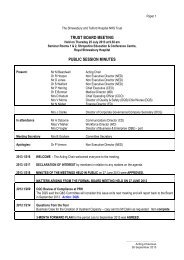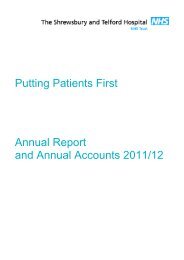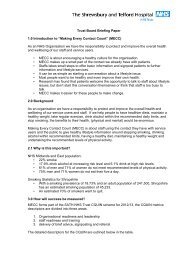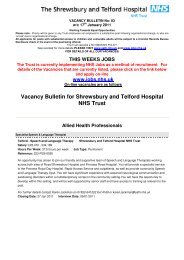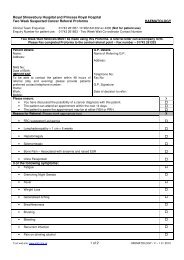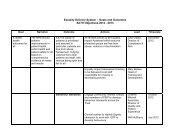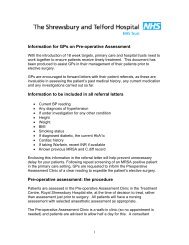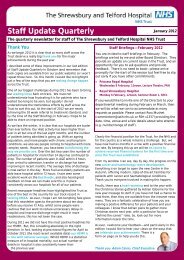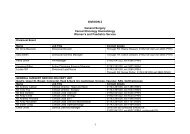Update from Alison Jones, GP Liaison GPConnect - Royal ...
Update from Alison Jones, GP Liaison GPConnect - Royal ...
Update from Alison Jones, GP Liaison GPConnect - Royal ...
Create successful ePaper yourself
Turn your PDF publications into a flip-book with our unique Google optimized e-Paper software.
<strong>GP</strong>Connect<br />
<strong>Update</strong> <strong>from</strong> <strong>Alison</strong> <strong>Jones</strong>, <strong>GP</strong> <strong>Liaison</strong><br />
June 2012<br />
Keeping <strong>GP</strong> Practices up-to-date with news <strong>from</strong> The Shrewsbury and Telford Hospital NHS Trust<br />
New Chief Executive appointed<br />
We are delighted to announce the appointment of Peter<br />
Herring as the new Chief Executive of The Shrewsbury and<br />
Telford Hospital NHS Trust. Peter is currently Chief<br />
Executive of the Countess of Chester Hospital NHS<br />
Foundation Trust, a role that he has held since May 2000.<br />
Under Peter’s leadership the Trust became one of the first<br />
ten Foundation Trusts in the country in 2004, so he has<br />
exactly the track record and experience we are looking for in<br />
Shrewsbury and Telford. Peter’s passion and commitment<br />
for the patient experience and patient safety is also clear, as<br />
the Countess of Chester is one of only five Trusts to have<br />
been awarded the CHKS Top40 Hospitals Award for its high<br />
clinical standards and outcomes for 12 consecutive years.<br />
Looking forward to his new role which he will take up later<br />
this year, Peter said “I am delighted to have been appointed<br />
as Chief Executive of The Shrewsbury and Telford Hospital<br />
NHS Trust. I have been really impressed with the team at<br />
the Trust and the staff I have met. The Trust is clearly<br />
making great progress in improving services to patients in<br />
Shropshire, Telford and Wrekin and mid Wales. By<br />
continuing to work in close partnership with our patients, our<br />
commissioners, other healthcare providers, local authority<br />
and voluntary sector partners I am confident that we will<br />
continue to enhance the services that we provide. Our<br />
priorities must be to continue to focus on the needs of our<br />
patients, to provide great care and to live within our means.<br />
By doing this we will also meet our key objective of gaining<br />
Foundation Trust status. Having led one of the first Trusts to<br />
achieve NHS Foundation Trust status I look forward to<br />
helping The Shrewsbury and Telford Hospital NHS Trust<br />
achieve that, and also to put in place the new capital<br />
developments that have recently been approved by the<br />
Strategic Health Authority”.<br />
Steve Peak, previously the Trust’s Transformation Director,<br />
is now interim Chief Executive over the summer, taking over<br />
the reins <strong>from</strong> Adam Cairns until Peter joins the Trust in<br />
September. Steve’s main priorities over the summer will be<br />
to continue with the improvements in the quality and safety of<br />
patient services, and to move forward with the development<br />
and the reconfiguration of hospital services, which includes<br />
beginning the building work on the new Women and<br />
Children’s unit at Princess <strong>Royal</strong> Hospital.<br />
New Trust Consultant appointments<br />
We are pleased to welcome our new colleagues to the Trust:<br />
Dr T <strong>Jones</strong>, Consultant Histopathologist, <strong>Royal</strong> Shrewsbury<br />
Hospital<br />
Mr M Kimuli, Consultant Urological Surgeon, <strong>Royal</strong><br />
Shrewsbury Hospital<br />
Dr B Pandey, Locum Consultant Obstetrician &<br />
Gynaecologist, <strong>Royal</strong> Shrewsbury Hospital<br />
Contact details are in the directories on the <strong>GP</strong>Connect web page.<br />
News for <strong>GP</strong>s: changes to C difficile testing<br />
Just to keep <strong>GP</strong>s informed that the Department of Health has<br />
recently issued updated guidelines for the diagnosis and<br />
reporting of Clostridium diffcile, and the Trust has made the<br />
appropriate changes to its laboratory testing and reporting.<br />
In brief, samples <strong>from</strong> patients over the age of 65 years will<br />
continue to be tested for C difficile. However, samples <strong>from</strong><br />
patients who are more than 2 years old but younger than 65<br />
years should only be tested if the patient has risk factors:<br />
these risk factors are if the patient is taking proton-pump<br />
inhibitors, has taken a recent course of antibiotics or has<br />
been a hospital inpatient in the last 30 days. We will only<br />
test for C difficile in this group of patients when <strong>GP</strong>s tell us<br />
that the patient is at risk, and if any of the risk factors are<br />
present please make an appropriate note in the clinical<br />
details on the laboratory request.<br />
Dr Graham Harvey, the Trust’s Lead Consultant<br />
Microbiologist, has recently written to <strong>GP</strong>s giving further<br />
details of the C difficile testing and reporting procedure, and<br />
a copy of this letter can be found at www.sath.nhs.uk/<br />
gpconnect/gpinformation.aspx<br />
The Consultant Microbiologists will be happy to give advice<br />
on the testing and reporting of C difficile, and on appropriate<br />
patient isolation and treatment, and they can be contacted on<br />
(01743) 261161. Please also email Dr Harvey directly at<br />
graham.harvey@sath.nhs.uk if you have any queries or<br />
concerns you would like to address to him.<br />
<strong>GP</strong>Connect contact: <strong>Alison</strong> <strong>Jones</strong>, <strong>GP</strong> <strong>Liaison</strong><br />
Strategy Directorate, Princess <strong>Royal</strong> Hospital, Apley Castle, Telford, TF1 6TF<br />
Telephone (01952) 641222 x4827 Mobile 07747 532926 Email: <strong>GP</strong>Connect@sath.nhs.uk Website: www.sath.nhs.uk/gpconnect<br />
1
Maternity Services update: Expanded Newborn Screening Programme as <strong>from</strong> July 2012<br />
As reported in the May 2012 edition of <strong>GP</strong>Connect, screening for the genetic metabolic disorder MCADD is part of the newborn<br />
screening programme. After careful consideration and discussion between the National Screening Committee and the Health<br />
Technology Assessment programme, it was agreed to undertake an evaluation of screening for an additional five rare genetic<br />
metabolic conditions using the same blood spot sample as is used for the MCADD screening. This evaluation is due to start in<br />
July 2012 and will run for one year. It is a joint piece of work between the National Institute of Healthcare Research and the UK<br />
National Screening Committee, and with the parents’ consent, babies born between July 2012 and July 2013 in our area (which<br />
is served by the newborn screening laboratory in Birmingham) will be tested for extra genetic conditions such as maple syrup<br />
urine disease, homocystinuria (pyridoxine unresponsive), glutaric aciduria type 1, isovaleric acidaemia and long chain<br />
hydroxylacyl CoA dehydrogenase deficiency (MSUD, Hcys, GA1, IVA and LCHADD respectively). The pilot will assess whether<br />
screening is clinically viable and cost effective, and all associated costs (such as laboratory and treatment costs) will be funded<br />
<strong>from</strong> the pilot, so there will be no additional financial costs for commissioners or providers. Further details for parents and<br />
healthcare professionals have been included in an information leaflet; healthcare professionals will give this leaflet to parents<br />
when they discuss the newborn screening programme with them, and the leaflet also explains how the results will be given to<br />
parents and the implications of a positive result. Please go to the <strong>GP</strong>Connect web page at www.sath.nhs.uk/gpconnect/<br />
gpinformation.aspx to see this leaflet and further information in the Expanded Newborn Screening Programme section. If you<br />
have any queries please contact the Trust’s Antenatal and Newborn Screening Co-ordinator, Sharon Lord, at<br />
sharon.lord@sath.nhs.uk or by calling Sharon on (01743) 261000 ext 3104.<br />
Support for children who have severe allergies<br />
The current recommendations for children who have had a<br />
suspected anaphylactic reaction is that they are admitted to<br />
hospital under the care of a paediatrician. Following<br />
discharge <strong>from</strong> the children’s acute ward, these children<br />
need to be seen in a specialist allergy service and require an<br />
adrenaline auto injector device and a comprehensive<br />
package of support (NICE Guideline 134, December 2011).<br />
In Shropshire we have a well established service for those<br />
children who have allergies, and both <strong>Royal</strong> Shrewsbury<br />
Hospital and Princess <strong>Royal</strong> Hospital have a specialist<br />
allergy clinic for children. The recently published NICE<br />
Guideline and the <strong>Royal</strong> College of Paediatrics and Child<br />
Health Allergy Pathways both highlight the importance of a<br />
comprehensive package of support and training for children<br />
who need to use devices. This has become well established<br />
over the years, and is provided by the Respiratory and<br />
Allergy Nurse Specialists within the acute setting, by the<br />
Children’s Community Nurses, and by the Shropshire School<br />
Nursing Service, who all provide support to children, families<br />
and school staff. When a child attending a Shropshire<br />
school is diagnosed with anaphylaxis an individual care plan<br />
is developed with the parents and training and support is<br />
offered to the child, the parents, carers and school staff.<br />
Annual training updates are also offered to families and<br />
school staff to keep their knowledge and skills up-to-date.<br />
Ongoing prescribing of the Epipen device for the<br />
management of anaphylaxis within primary care supports the<br />
current training and care package provided.<br />
If you have any questions about the allergy service or need<br />
further information please contact the Respiratory and<br />
Allergy Nurse Specialists in the Trust on (01743) 261636 at<br />
RSH, (01952) 641222 ext 4003 at PRH, the Children’s<br />
Community Nurses at Coral House on (01743) 450800 or the<br />
Shropshire School Nursing Service on (01939) 235277.<br />
Next <strong>GP</strong> education evening meeting - 19 July 2012<br />
Ophthalmology, with Dr Mike Lewis, <strong>GP</strong> with a special<br />
interest in ophthalmology, in the Shropshire Conference<br />
Centre, <strong>from</strong> 6.30pm. If you are interested please contact<br />
Eluned Eagle at eluned.eagle@shropshirepct.nhs.uk<br />
Improved telephone system at <strong>Royal</strong> Shrewsbury<br />
Hospital is bringing benefits to callers<br />
<strong>GP</strong>s and practice teams will be pleased to hear that an<br />
improved telephone system was introduced at <strong>Royal</strong><br />
Shrewsbury Hospital on 27 June 2012, to bring benefits to<br />
people calling the hospital’s main number. When you call<br />
the main switchboard number (01743) 261000 you now have<br />
the option to key in the extension number if you know it, as<br />
currently happens at Princess <strong>Royal</strong> Hospital. Callers will<br />
immediately be put through to the operator if they do not<br />
know the extension number.<br />
The improved system has been introduced after callers said<br />
they found it frustrating that they did not have the option of<br />
going straight through to the extension they required. The<br />
system at Princess <strong>Royal</strong> Hospital has proved a big success<br />
with over half of callers keying in the extension they want<br />
without needing to go through an operator.<br />
This will be a major advantage at <strong>Royal</strong> Shrewsbury Hospital<br />
as only some of the extension numbers could be dialled<br />
directly, meaning that even if you knew the non-direct dial<br />
extension number you had to go through the main<br />
switchboard to be connected.<br />
Just to remind practices that the Consultant/secretary contact<br />
directories are updated each month on the <strong>GP</strong>Connect page<br />
on SaTH’s website, giving current extension numbers: please<br />
look at this link http://www.sath.nhs.uk/clinicians/consultants/<br />
Consultant_Directories.aspx for the latest versions, and<br />
bookmark this page for your future reference.<br />
Keep in touch with the Trust’s <strong>GP</strong> <strong>Liaison</strong> Service<br />
Please keep your calls, emails and letters coming to me at<br />
Princess <strong>Royal</strong> Hospital: I can be contacted there on (01952)<br />
641222 ext 4827, or on my business mobile phone on 07747<br />
532926, or by emailing me at <strong>GP</strong>Connect@sath.nhs.uk<br />
<strong>GP</strong>Connect contact: <strong>Alison</strong> <strong>Jones</strong>, <strong>GP</strong> <strong>Liaison</strong><br />
Strategy Directorate, Princess <strong>Royal</strong> Hospital, Apley Castle, Telford, TF1 6TF<br />
Telephone (01952) 641222 x4827 Mobile 07747 532926 Email: <strong>GP</strong>Connect@sath.nhs.uk Website: www.sath.nhs.uk/gpconnect<br />
2



